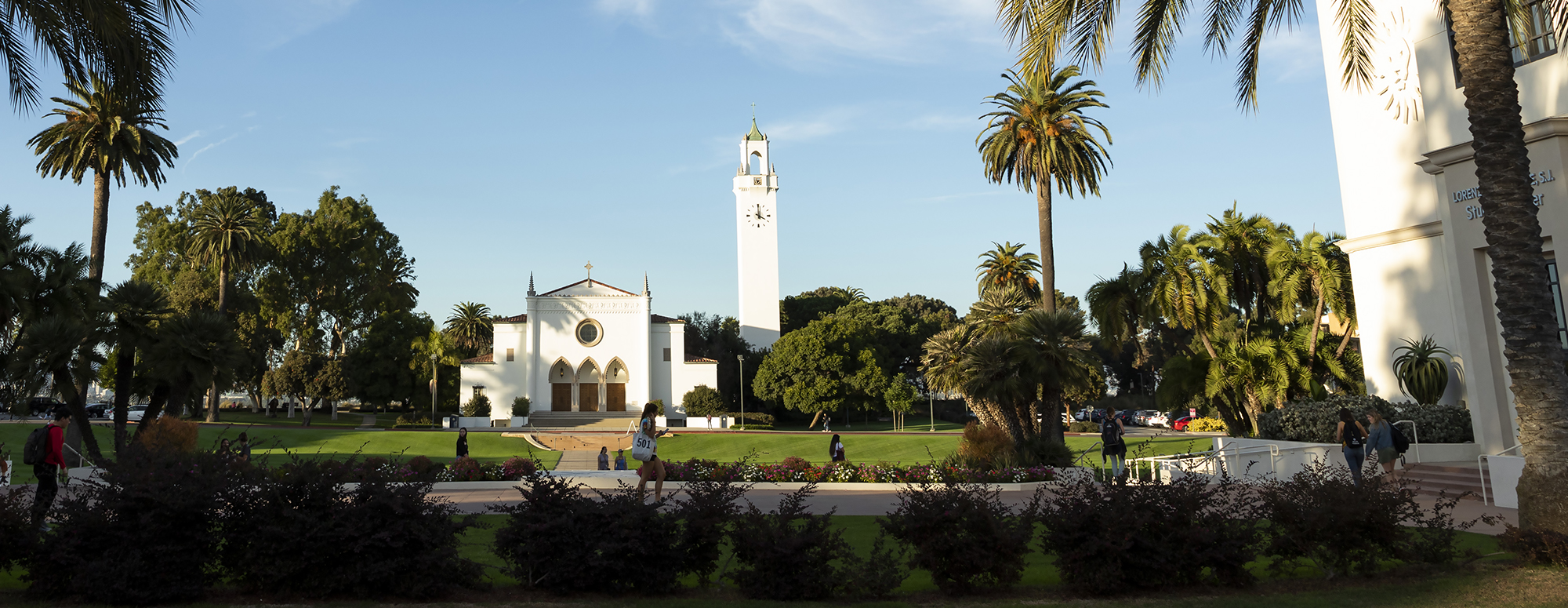
Creating the World We Want to Live In
The Strategic Planning Steering Committee thanks you for participating and collaborating in the ongoing process of discernment and dialogue regarding LMU's Strategic Plan for 2021-2026. On this page, you'll find a review of the Strategic Planning process so far and explanations of each of the elements of the Draft Strategic Plan.
Welcome and Overview
Hear from Sister Mary Beth Ingham and Father José Badenes, S.J. who explain the 18-month committee process, convoked by President Timothy L. Snyder, that has led to the following Draft 2021-26 Strategic Plan. Learn about key action items for Loyola Marymount University as we look to the next five years, and most importantly, how your voice can be heard in shaping the plan's final form.
Introduction
In the following document, the Strategic Planning Steering Committee describes the foundation, rationale, commitments, spotlight initiatives and action steps we believe LMU should pursue in order to achieve the following vision for LMU in 2026 and beyond:
LMU will equip a new vanguard of ethical leaders with the knowledge, abilities, and values to address the most pressing problems facing our rapidly changing global society.
Scroll down to explore the Draft Strategic Plan, or download a PDF of the document here. A version of this site en Español can be found here.
-
- Introduction
- Overview
- Preliminary Report and Community Feedback
- LMU in 2021
- Institutional Mission
- Core Values
- LMU in 2026
- Proposed Structure of the Plan
- Vision
- Commitments
- Anti-Racism, Diversity, Equity and Inclusion
- Innovation and Adaptability
- Extending Our Reach Beyond the Bluff
- Spotlight Initiatives
- Inclusive, Diverse, Equitable and Anti-Racist Learning Initiative
- Integrative and Interdisciplinary Thinking Initiative
- Personalized Connections Initiative
- Innovative Graduate and Professional Education Initiative
- New Pathways Initiative
- Next Steps
-
In September 2020, the Strategic Planning Steering Committee released a preliminary report to all community members describing our charge and mandates and our deliberative process thus far; proposing draft statements of LMU's institutional mission, core values, and strategic vision; and identifying nine strategic issues as potential areas of focus for the plan.
In the following weeks, the Steering Committee facilitated numerous focus group engagements across the community, utilizing a process co-designed by the Office of Mission and Ministry blending elements of Ignatian communal discernment practices and assisted by volunteer facilitators from LMU's religious communities, alumni of our mission-formation programs, and others. This included 18 open-invitation community discernment focus groups composed of faculty and staff, engaging over 150 participants, as well as 26 focus group meetings with existing campus leadership groups, including the President's Cabinet, Deans Council, Faculty Senate, Staff Senate, ASLMU, GSLMU, Trustees, Regents, and many others, engaging over 200 participants. This intentionally deliberative and time-intensive engagement allowed for both greater breadth of participation and greater depth of conversation than would have been otherwise possible and contributed invaluably to shaping this draft plan.
Following these weeks of community engagement, the committee deliberated extensively on how to interpret the insights provided by the community's feedback. In early November we reported back to the community a summary of those insights. While we cannot fully explore all that feedback here, several elements of the feedback strongly influenced the draft report that follows. In particular, the community feedback emphasized:
- A desire for the vision statement to be more concise and focused, and for all elements of the plan to be more tightly integrated around a clear "North Star" vision for the institution's future. (For our incorporation of this insight, see "Vision").
- A wish that LMU's educational work should have a direct impact on the many challenges faced by the world through preparing LMU's students for a lifetime of effective engagement with those challenges. (See "Vision").
- A preference that certain foundational commitments in the plan – in particular, LMU's commitment to anti-racism, diversity, equity and inclusion; to innovation, adaptability, and "nimbleness"; and to extending the reach of our external engagement and impact– should be conceived of, not as spotlight initiatives, but rather as anchoring principles –pervasive approaches that will characterize all LMU's efforts to improve the university's institutional character and enhance the university's actions across multiple initiatives. (See "Commitments").
- A desire for the plan's key initiatives to focus on enhancing academic quality and the student experience as LMU's main sources of value to students and families as well as the wider world. (See especially "Spotlight Initiatives" 1-4).
- A sense that LMU needs to take a more strategic and innovative approach to those forms of education that go beyond the experience the university offers to traditional undergraduates, including seeking expanded enrollments for selected graduate and professional degrees, for non-degree and continuing education programs, and among post-traditional students. (See especially "Spotlight Initiatives"4-5).
We have directly incorporated these key insights from the community feedback as we devised the structure and content of this draft strategic plan.
The sections that follow constitute the draft plan proper. In the next section, "LMU in 2021," we present the draft statements of "institutional mission" and "core values" that constitute the underlying foundation of the strategic plan. In the longer section that follows, "LMU in 2026," we offer a draft of the proposed "vision," "commitments," and "spotlight initiatives" for the plan.
-
Strategic plans traditionally begin with statements of "institutional mission" and "core values" which establish a foundation for the plan in enduring features of the institution's underlying purpose and character. As a distinctively mission-centric and values-based organization, LMU's usage of these terms is a part of daily life; as a consequence, our committee's articulation of statements of mission and core values in a strategic planning context – portions of which were developed in consultation with the Office of Mission and Ministry, the Faculty Committee on Mission and Identity, and the Trustee Committee on Catholic Mission and Identity – builds upon this ongoing community dialogue about mission and values. Here we extrapolate from that larger conversation specific insights we find relevant to the development of a proposed strategic vision for the period 2021-26, as well as anchoring principles and spotlight initiatives that help to accomplish that vision, as described in the sections that follow.
Institutional Mission
In the context of a strategic plan, the statement of mission should reflect the current reality of the institution's work. It should speak to the institution's ideals, but in particular to those ideals that authentically describe and motivate LMU as it exists today.
The steering committee proposes the following draft mission statement for the strategic plan, derived from the three pillars of the university's enduring mission:
Loyola Marymount University embodies the richness of our Catholic, Ignatian, Jesuit and Marymount identity in dynamic conversation with the most pressing issues that face the world today. Our location in the vibrant city of Los Angeles offers diverse cultural, creative, and intellectual wealth and boundless opportunity for encounter and innovation. Through rigorous inquiry and relational engagement, we develop individuals whose reflection, reasoning, imagination, and discernment call forth action for positive change in the world. We continually strive for inclusive community and to advance our university mission:
- The encouragement of learning
- The education of the whole person
- The service of faith and promotion of justice.
Core Values
In a strategic planning context, core values are those attributes that constitute the central and enduring features of the institution's identity. They are not the same as the full set of aspirational values the institution wishes to possess: rather, they are values that the institution already exhibits in its everyday conduct, that distinguish the institution meaningfully from similar organizations, and that the institution's stakeholders believe should take priority in its most-significant choices over other competing values, now and in the immediate.
The steering committee proposes the following draft statement of core values for the strategic plan:
Loyola Marymount University embraces the following values as fundamental to our identity and living out our mission:
- Whole-Person Learning: Rooted in our Catholic, Ignatian, Jesuit, and Marymount traditions, we recognize that educational excellence is multi-dimensional. We develop well-integrated individuals who exercise critical analysis, creative thinking, ethical reasoning, and compassionate discernment throughout their lives.
- Community Built on Relationships: We are a community of care that supports and contributes to the holistic well-being of each of its members. We affirm that our mission is best achieved in an environment of authentic concern for all persons, characterized by inclusion and respect for human dignity.
- Education for Action: Inspired by the call to a faith that does justice, we challenge ourselves as a community and as individuals to pursue the more universal good. We are thinkers and leaders driven to engage imaginatively the world's deepest needs and most urgent challenges.
LMU in 2026
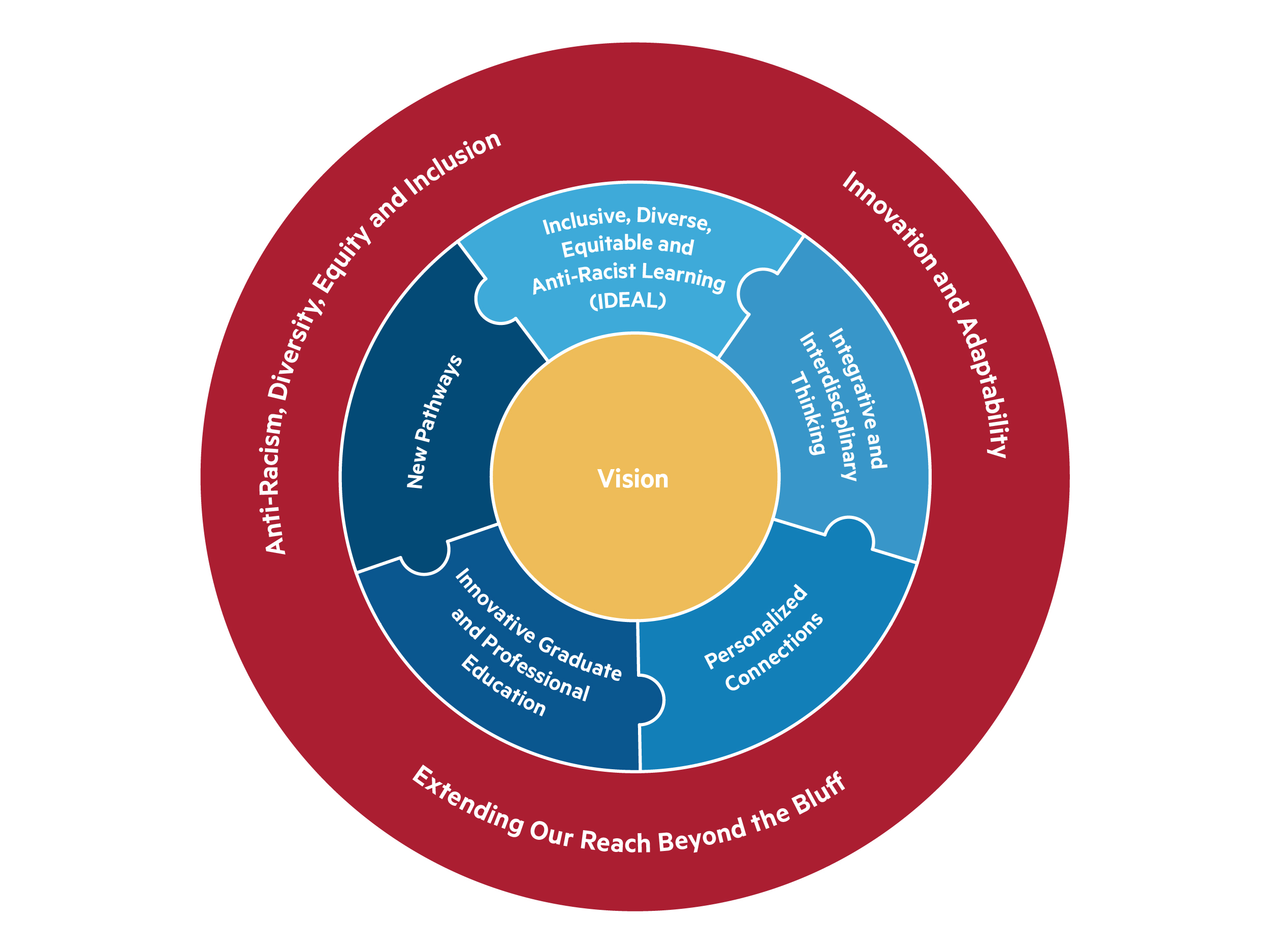
PROPOSED STRUCTURE OF THE PLAN
Our draft plan conceives of LMU's strategy as consisting of three interdependent elements.
First, we propose a unifying Vision, which describes what LMU will look like in the future as a consequence of the plan's success.
Second, we identify three proposed Commitments, which are intentional elements of LMU's overall institutional approach that we believe are keys to our future success and will help distinguish what LMU does from other institutions of higher education.
Finally, we name five proposed Spotlight Initiatives, a set of specific proposals for actions that draw on one or more of the commitments to help move us toward achieving the vision.
The accompanying diagram illustrates the interrelation between these three elements.
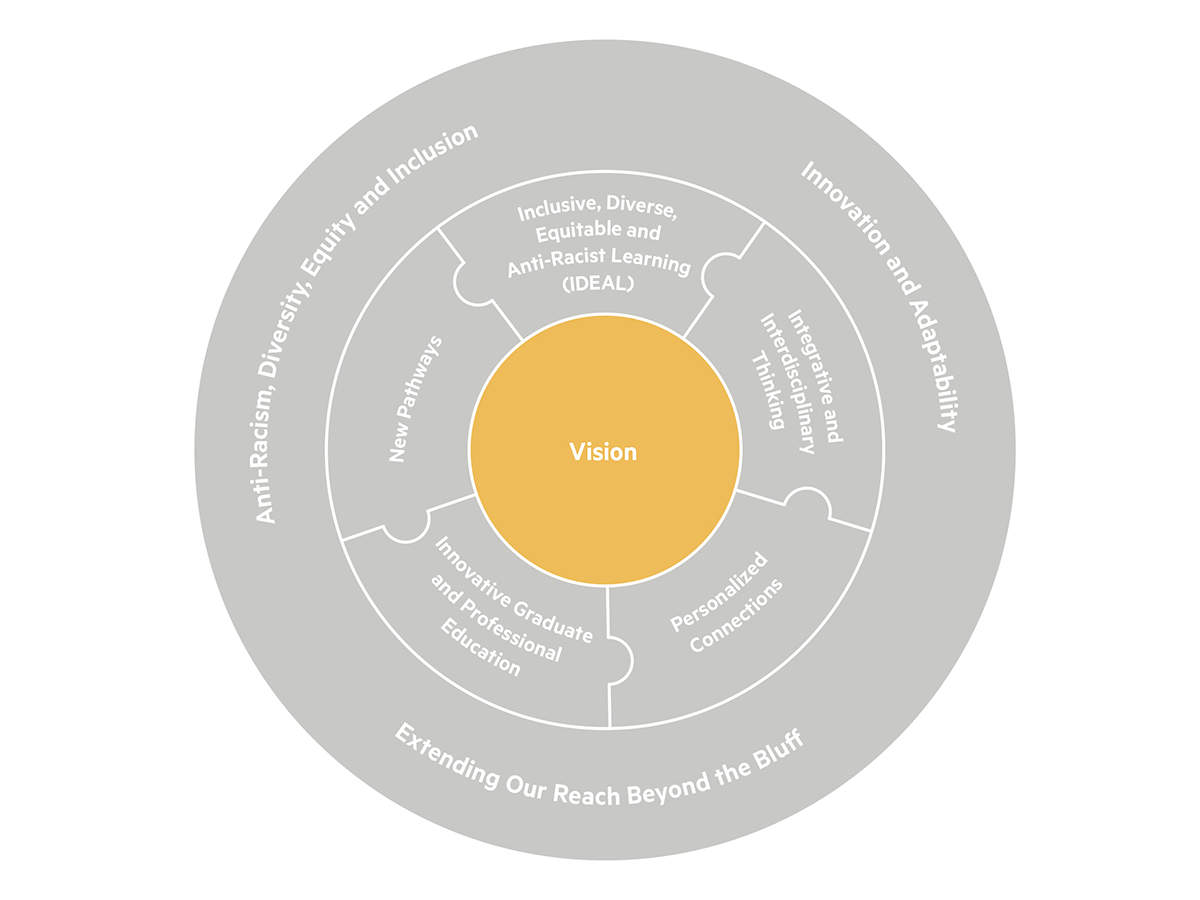
VISION
Our strategic Vision describes what LMU will look like in the future as a consequence of the plan's success.
It constitutes the primary focus of LMU's strategic efforts and articulates the common purpose that we ask all members of the community to commit to advancing.
As noted above, one of the consistent insights we received from the community feedback on the preliminary report was a desire for the vision statement to be more sharply focused and concise. We have taken this advice to heart and limited our proposed vision statement to a single sentence:
LMU will equip a new vanguard of ethical leaders with the knowledge, abilities, and values to address the most pressing problems facing our rapidly changing global society.
This statement distills the three most compelling elements of the university's overall efforts: who LMU serves, what LMU does, and why:
Who LMU Serves
"A New Vanguard of Ethical Leaders"
LMU's most fundamental purpose is found in the kind of students the university helps to form and the graduates the university helps to produce. LMU's students are not like those of all other universities: rather, through their distinctive learning experiences here, they become part of a cadre of persons for and with others – persons who seek lives of meaning and purpose, who value diversity, inclusion, and justice, and who possess exceptional capacity and commitment to influence the world for good.
What LMU Does
"Equip With Knowledge, Abilities, and Values"
LMU prepares students to be contemplatives in action, able to understand and benefit a world in need. Like all universities, LMU cultivates knowledge and skills; as a mission-defined university, LMU does so with a distinctive commitment to fostering virtues of intellect, character and spirit, intentionally, and to furthering the creative potentialities that emerge when contemplation and action mutually inform one another.
Why LMU Does It
"Pressing Problems Facing our Rapidly Changing Global Society"
The world is changing rapidly, and often in directions that do not conduce to justice and the common good. Addressing these problems will require wisdom, creativity, and commitment. Because of LMU's mission, traditions, and community members, LMU possesses a unique potential to educate with purpose in a way that helps students become responsive to the new scale and velocity of the practical challenges and ongoing injustices confronting the contemporary world.

COMMITMENTS
Our Commitments describe the elements of LMU’s overall approach that will distinguish what LMU does from other institutions of higher education.
We conceive of these elements as the keys to LMU’s future success, a set of aspirational values that LMU intends to embody more fully as an institution.
The commitments also constitute criteria that help to determine the selection of spotlight initiatives and that will be used during implementation to guide the evaluation and future refinement of the plan.
Our three proposed commitments are: anti-racism, diversity, equity and inclusion; innovation and adaptability; and extending our reach beyond the bluff.
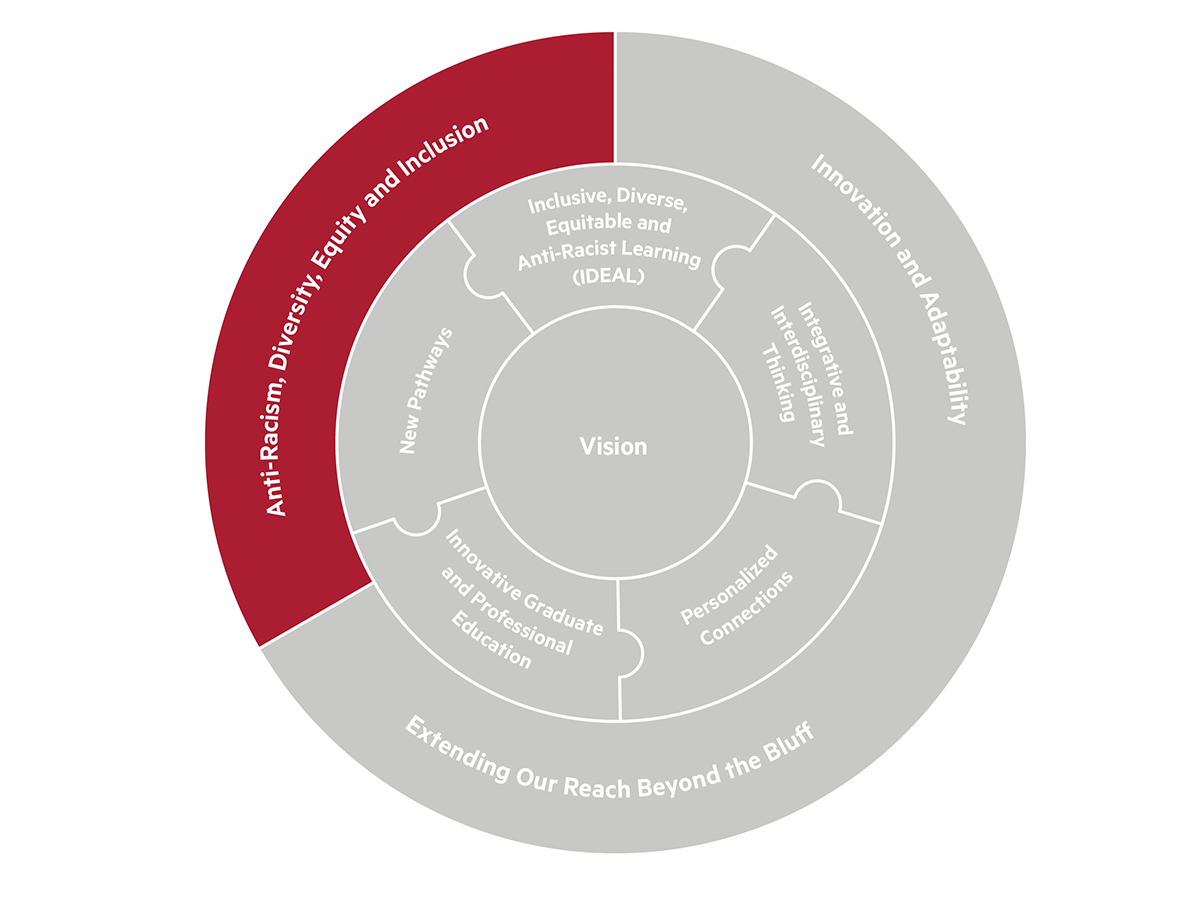
Anti-Racism, Diversity, Equity and Inclusion
We will uphold anti-racism, diversity, equity and inclusion in all that we do.
Rationale and Strategic Approach
LMU's diversity of students, faculty, and staff has steadily become more central to our institutional identity and strength, in a way that is reflective of and responsive to our Los Angeles home. As a Catholic, Ignatian, Jesuit and Marymount university, the values of diversity, equity, and inclusion have roots in our commitment to the dignity of all persons and to the service of faith and the promotion of justice. We also believe that success in improving diversity, embracing anti-racist practices and strengthening our inclusive excellence is key to widening our appeal and enhancing our educational quality and creativity in an increasingly complex world. Although improving our institutional diversity and equity (DEI) outcomes has a broad base of support among faculty, staff, and leadership, overcoming systemic barriers to thriving and success for all members of our community will require us to commit to practices, policies, and an organizational culture and climate that will make LMU a national leader in mission-driven, anti-racist institutional and educational practices.
This commitment encourages us to pursue actions that will:
- Increase the diversity of our LMU students, faculty, staff, and administrative leadership, while ensuring accountability through the use of a specific goals and metrics.
- Make our organizational climate and culture more anti-racist, diverse, equitable, and inclusive at all levels through education and training programs and systemic analysis of structures and practices.
- Ensure that an LMU education is unequivocally inclusive by working to decolonize the curriculum and to encourage anti-racist curricular and co-curricular collaborations.
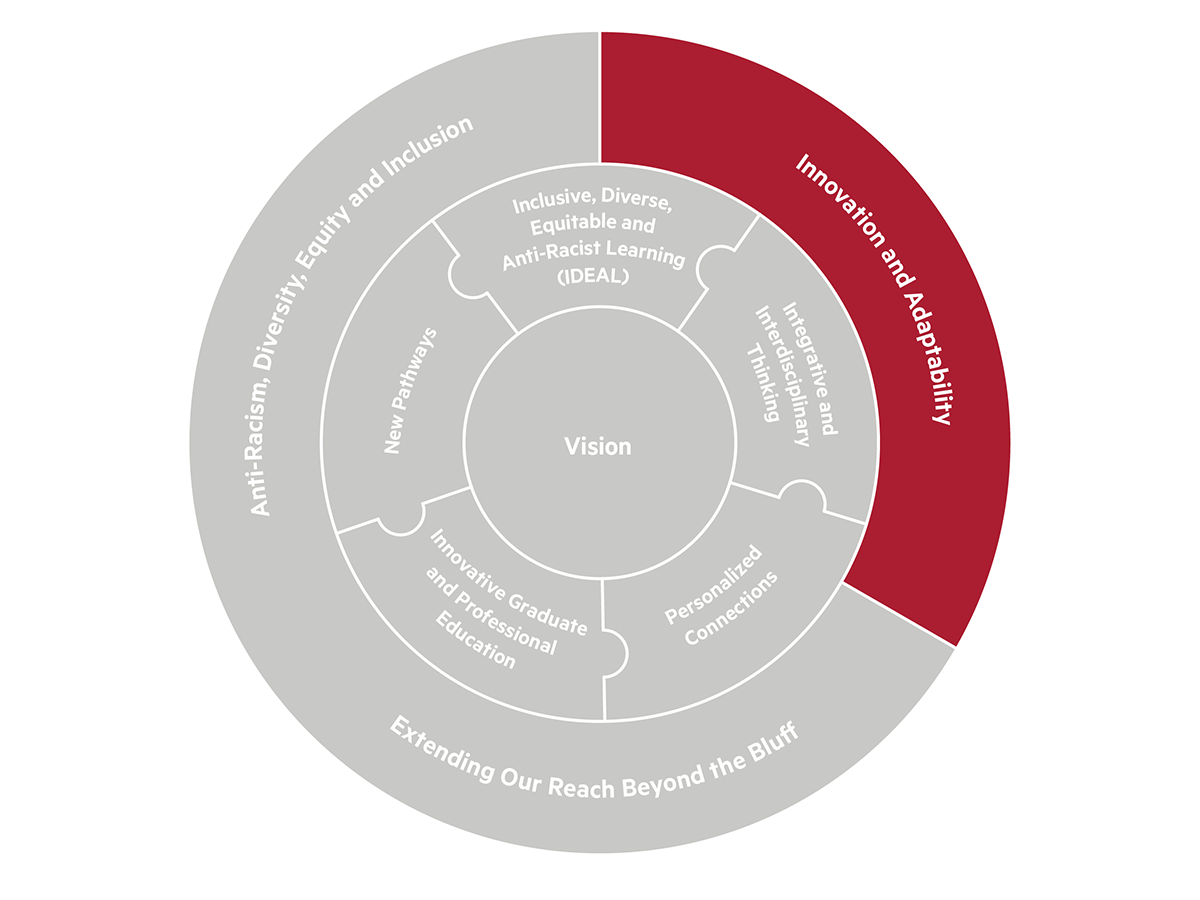
Innovation and Adaptability
We will innovate together across boundaries of all kinds to improve continually in research, teaching, and preparing students for the challenges ahead.
Rationale and Strategic Approach
LMU's rapidly changing external environment will increasingly require the ability to adapt to changing technological, demographic, economic, environmental and socio-political trends. We aspire to exhibit creativity in our education and shared work, yet our organizational culture and structures do not always nurture innovation or adaptability. Yet the hallmark of Ignatian education has always been its responsiveness to emerging needs and its continual adaptation toward serving the more universal good. As the content and impact of human knowledge changes and as enhanced modes of teaching and learning become available, LMU must improve its flexibility and willingness to experiment and take calculated risks. As the world's "wicked problems" become increasingly complicated and multi-dimensional, LMU must further embrace interdisciplinary approaches of research and teaching and improve our ability to collaborate across functional and disciplinary boundaries. As the university's approach to its future becomes more intentional and strategic, we must enhance our practices of consultative decision-making to more effectively arrive at clear choices about long-term priorities and to deliberate more inclusively and creatively about both ends and means.
This commitment encourages us to pursue actions that will:
- Support and motivate a university-wide culture of experimentation, innovation and strategic risk-taking.
- Dismantle or overcome organizational silos and improve structures for interdisciplinary collaboration.
- Extend and strengthen curricular/co-curricular collaborations that enhance student learning.
- Improve the effectiveness of decision-making and shared governance practices to ensure inclusive consultation and greater adaptability to changes in the external environment.
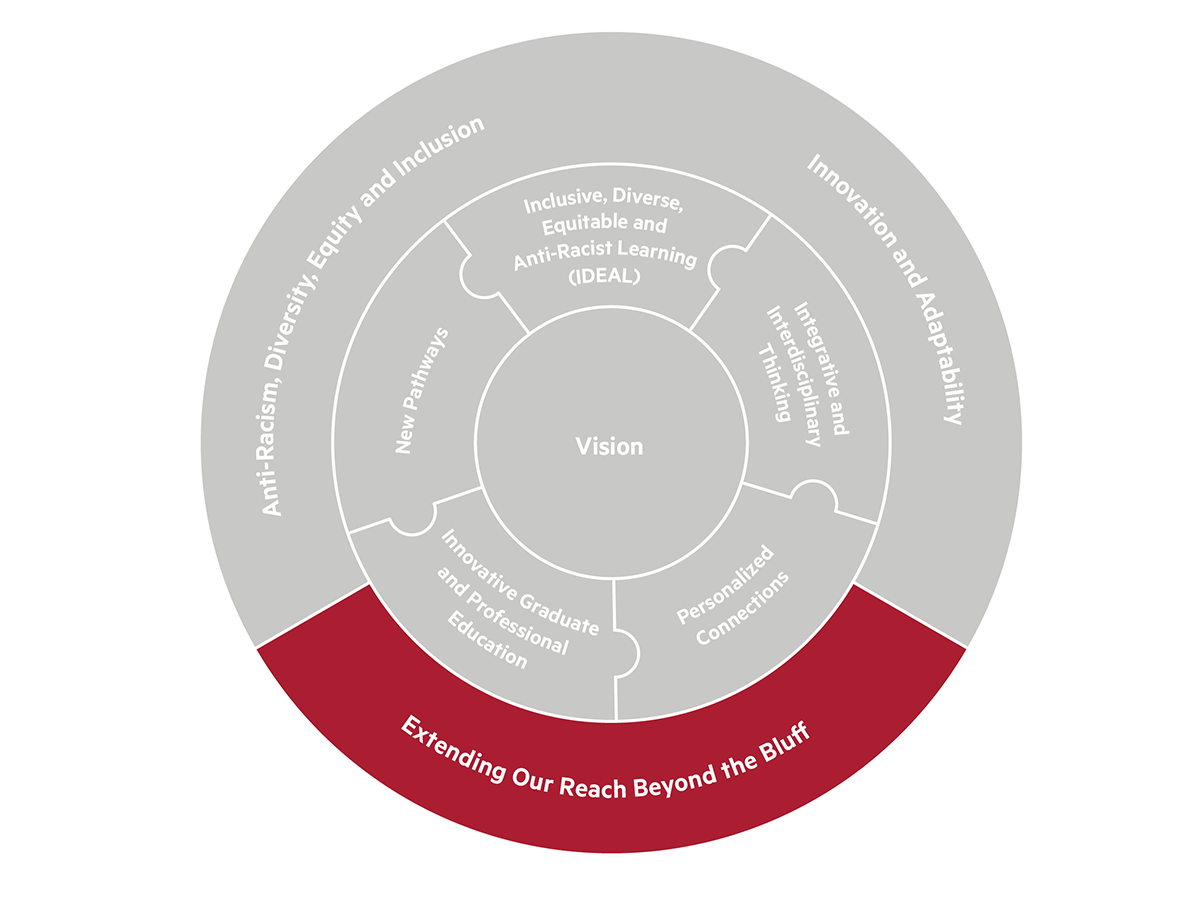
Extending Our Reach Beyond the Bluff
We will increase the range and variety of our engagements locally, nationally and globally to broaden the experiences and insights our students encounter as they prepare to impact an increasingly interdependent world.
Rationale and Strategic Approach
LMU's scenic location and intimate community atop our famous bluff have often led us to focus inward, at the expense of engaging the world beyond. The ongoing mission of Catholic higher education, however, is to continually engage the frontiers of both knowledge and service to others, forming "whole persons of solidarity with the real world." In an increasingly global and interdependent world, located at the crossroads of the United States, the Pacific, and Latin America, in the world's largest Catholic Archdiocese, with the world's fastest-growing media-technology nexus at our doorstep and the world's most culturally diverse city as our neighborhood, LMU has exceptional opportunities for both local and global interaction. We must vigorously engage the world our students are preparing to enter, and build the partnerships that will enrich our students' experiences and their potential to learn and grow.
This commitment encourages us to pursue actions that will:
- Selectively engage and extend initiatives that promote globally conscious perspectives and diversify international learning experiences.
- Pursue partnerships that enhance student learning opportunities, including local partnerships both with industry and with underserved populations.
- Continue to strengthen our national and international reputation.

SPOTLIGHT INITIATIVES
Our Spotlight Initiatives describe the main objectives and actions on which the plan will focus. We intend for each spotlight initiative to:
- advance a single, specific strategic goal consonant with the university's mission through multiple tactical actions linked together cohesively;
- build upon one or more of the plans strategic commitments;
- produce or extend a competitively differentiating advantage for the university; and
- involve a significant investment of financial resources, time and/or leadership focus
Importantly, these spotlight initiatives do not list every action LMU will pursue over the next five years. Many activities that are part of our core academic and business operations must continue and, in some cases, intensify in order to provide educational excellence, ensure stable enrollments and finances, and advance the elements of our overall strategy effectively. Notably, several of the spotlight initiatives below build directly on elements of the previous strategic plan "Forming Leaders who Transform the World, 2012-20." In addition to these extensions of previous strategic initiatives, we will continue to consolidate our progress on key achievements from the previous strategic plan, including our efforts to:
- promote academic excellence and rigor,
- continue our focus on post-baccalaureate success,
- value and support the teacher-scholar model,
- expand local and global engagement,
- deepen our commitment to sustainability and environmental justice, and
- significantly enhance the university's reputation.
Thus the omission of a specific item from the spotlight initiatives below does not necessarily mean it is unimportant or that we will not pursue it with intention. Instead, the spotlight initiatives constitute the proposed focal points for unified action we believe are required to achieve the vision and build a better institutional future. We single them out in order to structure our organizational thinking, prioritize the allocation of scarce strategic resources, and solicit an all-hands effort from the university community. For 2021-26, we propose that the most impactful spotlight initiatives for LMU to take are:
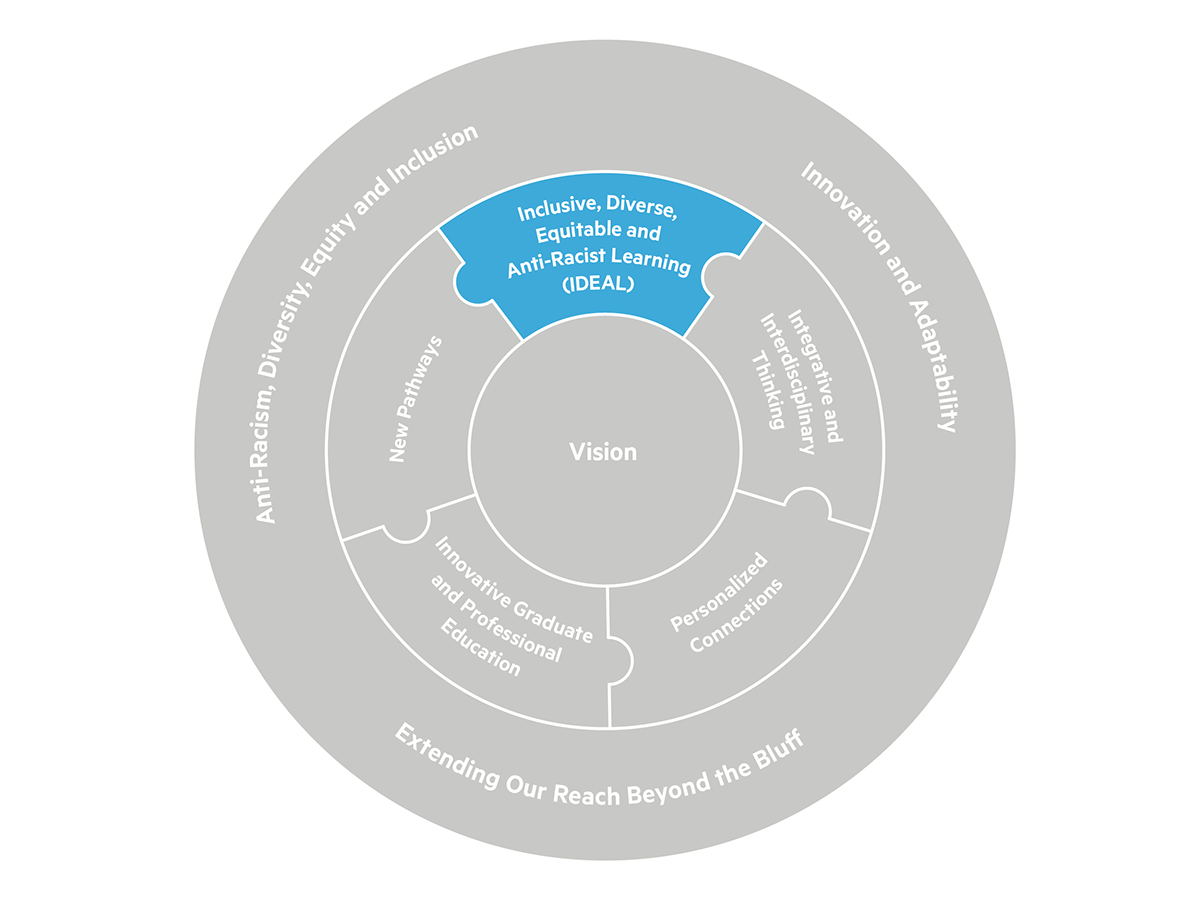
Inclusive, Diverse, Equitable and Anti-Racist Learning (IDEAL) Initiative
LMU will transform its academic and student life experience to fully embrace diversity and inclusion as defining features of an LMU education.
Rationale and Strategic Approach
Embracing anti-oppressive pedagogies, which include anti-racist approaches, and expanding notions of excellence and success to be more inclusive and justice-oriented, is foundational for our educational vision. We will offer strong and challenging academic and co-curricular programs that address issues of identity and difference as well as broaden our students' global horizons. Diversity enhances human creativity, inclusion enriches interpersonal engagement, and equity-mindedness enables social transformation. Students whose learning has been shaped by a commitment to inclusive excellence and anti-racism are most likely to acquire the distinctive insights, cultural competencies, and value commitments that will be needed to address the world's most pressing problems. By spotlighting an initiative to enhance inclusive, diverse, equitable and anti-racist practices and to recruit the students, faculty and staff needed to ensure success, we can enlist the university's collective effort behind fulfilling the rich promise of an LMU education.
Objectives & Actions
-
Actions:
- Review and revise core curriculum and major/minor curricula to address racism and other forms of oppression more directly and extensively, and to enhance awareness of and engagement with the resulting impacts on academic disciplines, cultural presuppositions, and social structures.
- Expand professional development support for and usage of inclusive pedagogies (for example, universal design for learning (UDL), anti-oppressive teaching and pedagogical practices, etc.) by faculty in all disciplines.
- Increase coordinated curricular/co-curricular engagement with challenging issues related to diversity, equity and inclusion, including a possible anti-racism service or engaged learning-experience requirement.
- Support student life structures that promote diversity, equity and inclusion (for example, restorative justice practices).
-
Actions:
- Set clear expectations for success in recruitment and retention of faculty from historically under-represented groups, and align hiring practices and faculty support structures to ensure success.
- Recognize and reward forms of teaching, research and service that promote diversity, equity, and inclusion, including curriculum transformation and recognition of "informal/invisible" service.
- Review departmental tenure and promotion standards and merit review processes to recognize a broad range of expressions of excellence in scholarship, teaching, and service in ways that are inclusive and academically sound.
- Strengthen formal and informal structures for mentoring, support, and thriving of faculty across their career.
-
Actions:
- Set clear expectations for success in student recruitment from historically under-represented groups.
- Strengthen pathways and infrastructure for recruiting students from historically underrepresented groups to attend LMU and increase support for programs and initiatives that demonstrate success in the retention, thriving and success of these students at LMU and beyond.
- Improve access for all students to high-impact learning opportunities such as study abroad, internships, and undergraduate research.
- Increase fundraising for scholarships that facilitate efforts to diversify the student body.
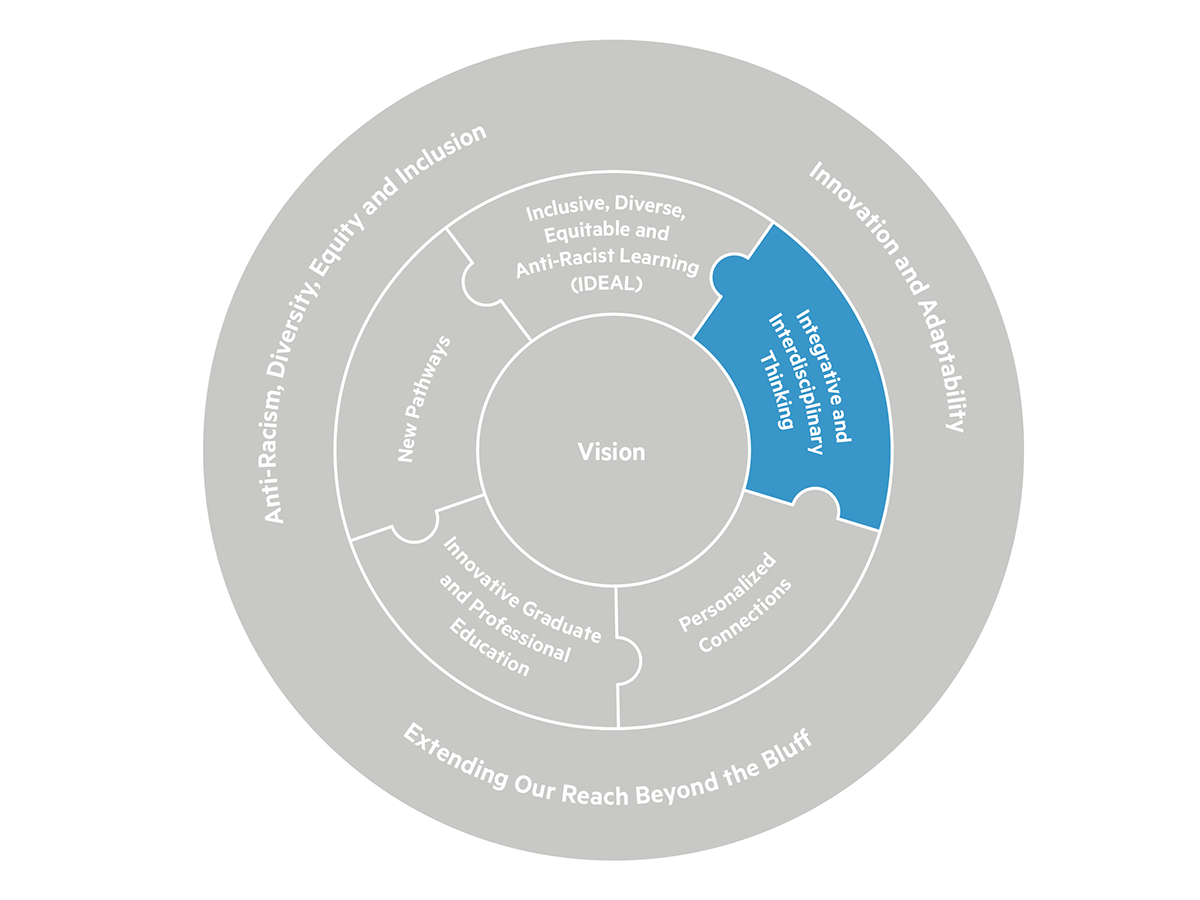
Integrative and Interdisciplinary Thinking Initiative
LMU will establish a distinctive academic specialization in preparing students to use interdisciplinary and integrative thinking approaches that enable multi-dimensional analysis, critical reasoning and creative problem-solving.
Rationale and Strategic Approach
The world's most challenging problems will only be solved by transcending the current boundaries that separate forms of human knowledge and combining the disciplines of rational discourse with the distinctively human capacities for creativity and ethical discernment. In a world where more and more functions will be performed by automation or artificial intelligence, there will be increasing need for those distinctively human virtues of mind and character that liberal arts higher education, especially in the Catholic tradition, has always emphasized. LMU has the opportunity to distinguish itself as a university that prepares its students for this ever-evolving future by foregrounding interdisciplinary and integrative thinking as the hallmark of an LMU education. By leveraging existing interdisciplinary strengths, such as the undergraduate core curriculum, as well as expanding interdisciplinary offerings in graduate and professional fields and recruiting faculty in areas of interdisciplinary strength, LMU can affirm its commitment to this approach. Likewise, by further extending opportunities for global and engaged learning experiences and by intentionally positioning ourselves as leaders in educating for imagination, creativity, and ethical discernment, LMU can attract and form students with the integrative thinking capacities it will take to solve the world's biggest challenges and that will enhance their opportunities for career success and external impact.
Objectives & Actions
-
Actions:
- In consultation with faculty, develop a university-wide framework to assess and assure appropriate attention to integrative thinking, creativity and imagination, and ethical reasoning and discernment, including reviews of university learning outcomes, curricula and pedagogy.
- Continue to expand usage of pedagogies, curricula, and co-curricular experiences that emphasize experiential and engaged learning, project-based learning, and reflective learning, especially those that engage directly with "wicked problems" in selected areas of interdisciplinary excellence and exploration.
- Fundraise for a "creativity-ready" campus, including additional spaces to support programs in fine arts, engineering, and digital and immersive learning.
-
Actions:
- Strengthen the educational impact of the interdisciplinary dimensions of core curriculum, including possibly creating an Interdisciplinary Academy/Academy of the Core.
- Leverage the flexibility of the University Honors Program curriculum as a laboratory for innovation in interdisciplinary teaching and learning.
- Explore the creation of selected new interdisciplinary major and minor academic programs.
- Explore potential expanded use of academic concentrations, certificates, badges, and micro-credentials that recognize thematic or skill-based multi-disciplinary experiences at a smaller scale than a traditional major or minor.
- Expand opportunities and support for collaborative teaching.
- Increase fundraising for endowed chairs and professorships with interdisciplinary expertise in select fields.
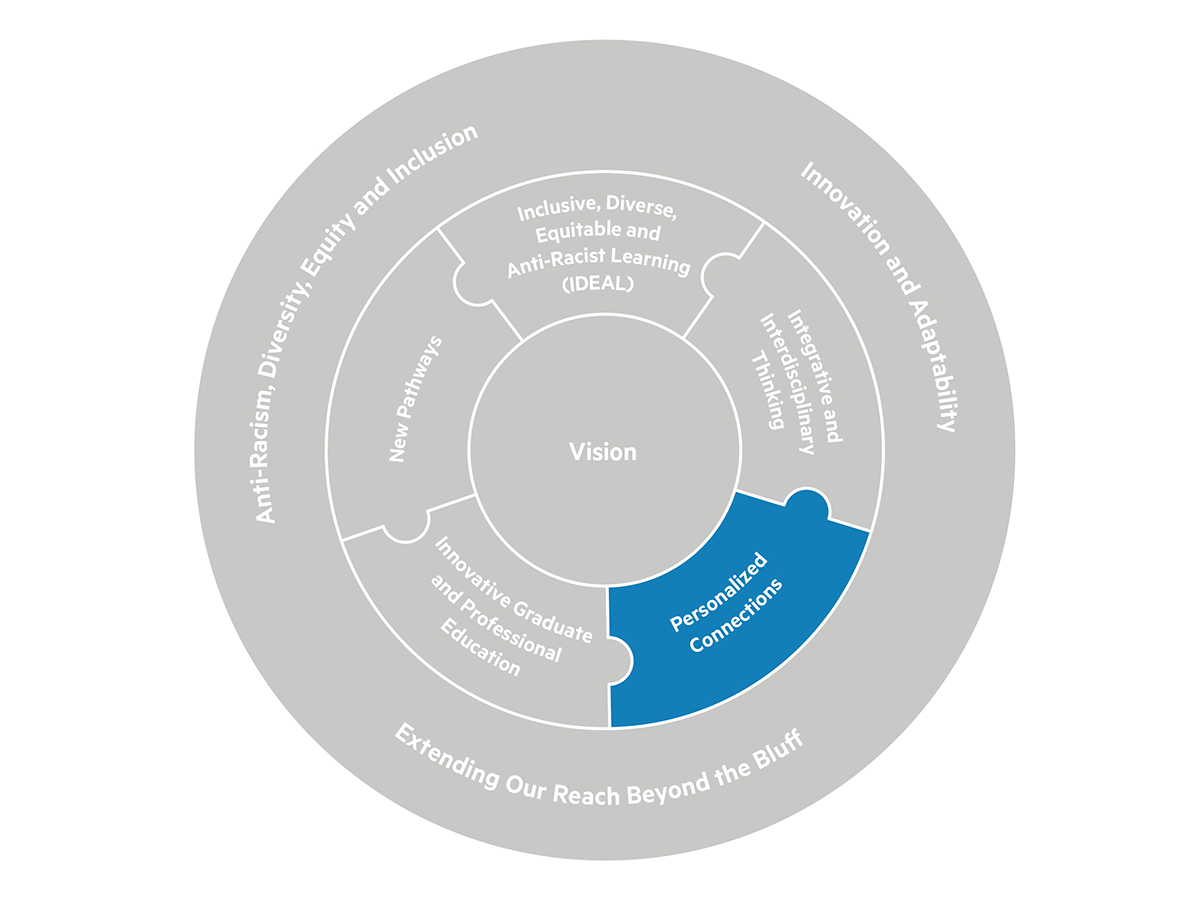
Personalized Connections Initiative
LMU will continue to maximize the value of our world-class, high-touch educational experience and ensure consistently strong retention and student success outcomes through a concerted university effort to facilitate engaged and personalized connections between students and the faculty and staff who support them.
Rationale and Strategic Approach
A key part of LMU's signature value proposition is the holistic and profoundly interpersonal educational experience our students receive. Founded in our mission to educate the whole person, LMU's special commitment to intimate class settings, academic mentoring, rich student life opportunities, and support for student success is critical to the distinctive value we provide. In the post-pandemic environment, the quality of this personalized experience will become even more central among the reasons students and families select an LMU education. LMU can leverage its foundational commitment to whole-person education by providing learning experiences distinguished by the personalized connections students make with our faculty, staff, and other students. These connections, supported by a university-wide commitment to information-sharing and collaborative student engagement programs and practices, will constitute a central reason why students choose and remain at LMU, and will help ensure that our students experience greater degrees of academic success and whole-person flourishing. These personalized connections will also foster the intimate formative experiences that help equip students to become leaders who make a positive impact in the world.
Objectives & Actions
-
Actions:
- Increase proportion of tenure-line and full-time faculty and maintain favorable student/faculty ratio and small class sizes to preserve strong personalized connections.
- Strategically expand usage of curricular and co-curricular high-impact practices (HIPs) for student success such as global learning, engaged learning experiences, internships and student work experiences, leadership development, and research opportunities – and in doing so, ensure equitable access to these learning experiences.
- Consider developing a 4-year HIPs plan and/or an LMU Experiences Transcript to guide and document curricular and co-curricular aspects of a student's development.
- Leverage recent gains in familiarity with technology-assisted pedagogies to establish faculty, staff and student fluency in interfacing through technology as a key feature of LMU's personalized connections.
- Extend the value of an LMU education by consolidating and/or further enhancing career and professional development services along with alumni engagement and lifelong learning opportunities.
-
Actions:
- Create a more coordinated, centralized and communicative student success infrastructure that includes a "web of support" technology foundation to facilitate undergraduate and graduate student transition and onboarding, curricular and co-curricular engagement, and continued and timely progress towards degree.
- Create structures and practices that ensure institution-wide coordination and information-sharing to support student success and evidence-based decision-making while protecting data privacy and information security.
- Expand impact of student advising and academic services and increase awareness of available support structures among students, faculty and staff.
- Revisit our approach to summer term and/or new "intersession" course offerings and modalities to enhance flexible learning options for students.
- Enhance support structures and self-help tools for student health and well-being.
- Attend to diversity and equity considerations in devising student success structures and services.
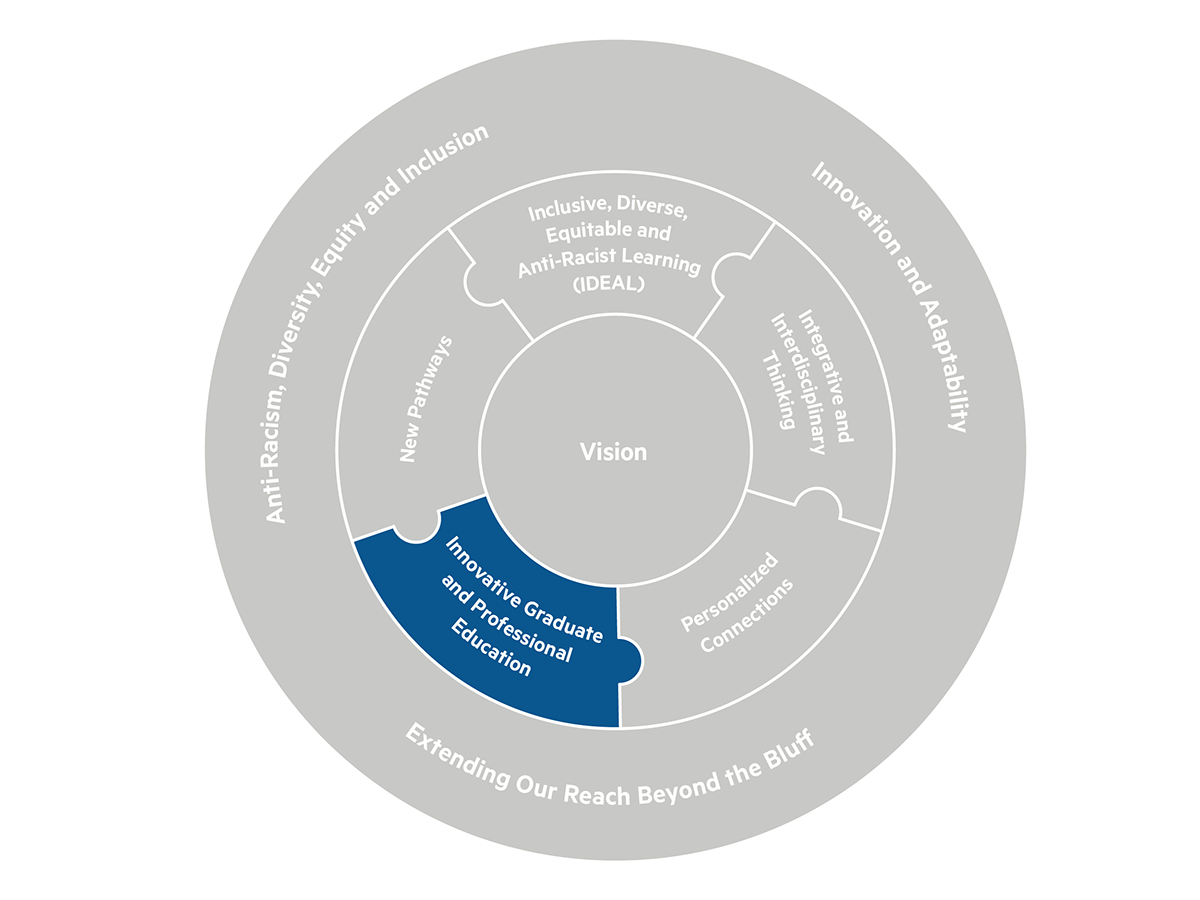
Innovative Graduate and Professional Education Initiative
Rapidly adapt LMU's graduate and professional education offerings to provide competitive, mission-resonant, revenue-generating programs that respond to new market climates and societal needs.
Rationale and Strategic Approach
LMU's identity has long centered on our undergraduate programs, even while we have sustained achievement in some signature areas of professional education (including law and education) and recently expanded into new doctoral (educational leadership for social justice), master's (data analytics, legal studies) and non-degree/certificate programs. This centrality of the undergraduate experience has sometimes created a tendency to undersell or overlook our graduate programs and their students; it has also led to some degree of identity crisis as we try to reconcile the undergraduate and graduate/professional aspects of our institutional character. This presents an opportunity for us to expand the reach of our strategic vision: LMU can greatly enhance the number and quality of the "vanguard of ethical leaders" it prepares and fulfill the Jesuit imperative of meeting people where they are by taking a more innovative approach to graduate and professional education. In addition, our reputation, rankings and public profile will require academic excellence and enrollment success in key graduate and professional fields. Moreover, with our financial foundation in undergraduate enrollments increasingly vulnerable to rapid changes in the external environment, we are more motivated than ever to seek alternative sources of increased enrollments through our graduate and professional degree programs.
Objectives & Actions
-
Actions:
- Establish a revolving source of competitive internal seed funding to assist colleges and schools in developing innovative new graduate and professional programs en route to establishing long-term fiscal sustainability.
- In collaboration with faculty, adapt the academic review process and program governance structures for graduate/professional program to encourage innovation and responsiveness to emerging opportunities while sustaining academic quality.
- Revise existing budget frameworks to establish appropriate incentives that promote academic innovation, market-responsiveness and enrollment growth.
- Enhance LMU's use of relevant market research and data-based decision-making about graduate programs.
-
Actions:
- In collaboration with faculty, comprehensively review existing graduate and professional programs for alignment with strategic criteria, including mission-enhancement, leveraging of existing strengths, fit with employment opportunity demand, ability to promote academic reputation, and potential for diversified revenue streams for the university.
- Based on the comprehensive review and in dialogue with faculty, develop a coherent overall portfolio of selected research-degree master's programs, interdisciplinary graduate/professional offerings, and market-distinctive graduate online/hybrid programs, and establish appropriate infrastructure to support academic quality for the new portfolio of programs.
- Stabilize current doctoral program enrollments to ensure we meet requirements for national university status and, in dialogue with faculty, determine whether to add new doctoral programs and/or convert selected existing master's programs to doctoral programs.
- Provide an appropriate support infrastructure to facilitate student success and make LMU an attractive destination for graduate and professional students (for example, by enhancing professional development, grant-writing, and job placement resources).
- Ensure that these steps combine to result in increased graduate enrollments and increased share of university tuition income from graduate programs overall.
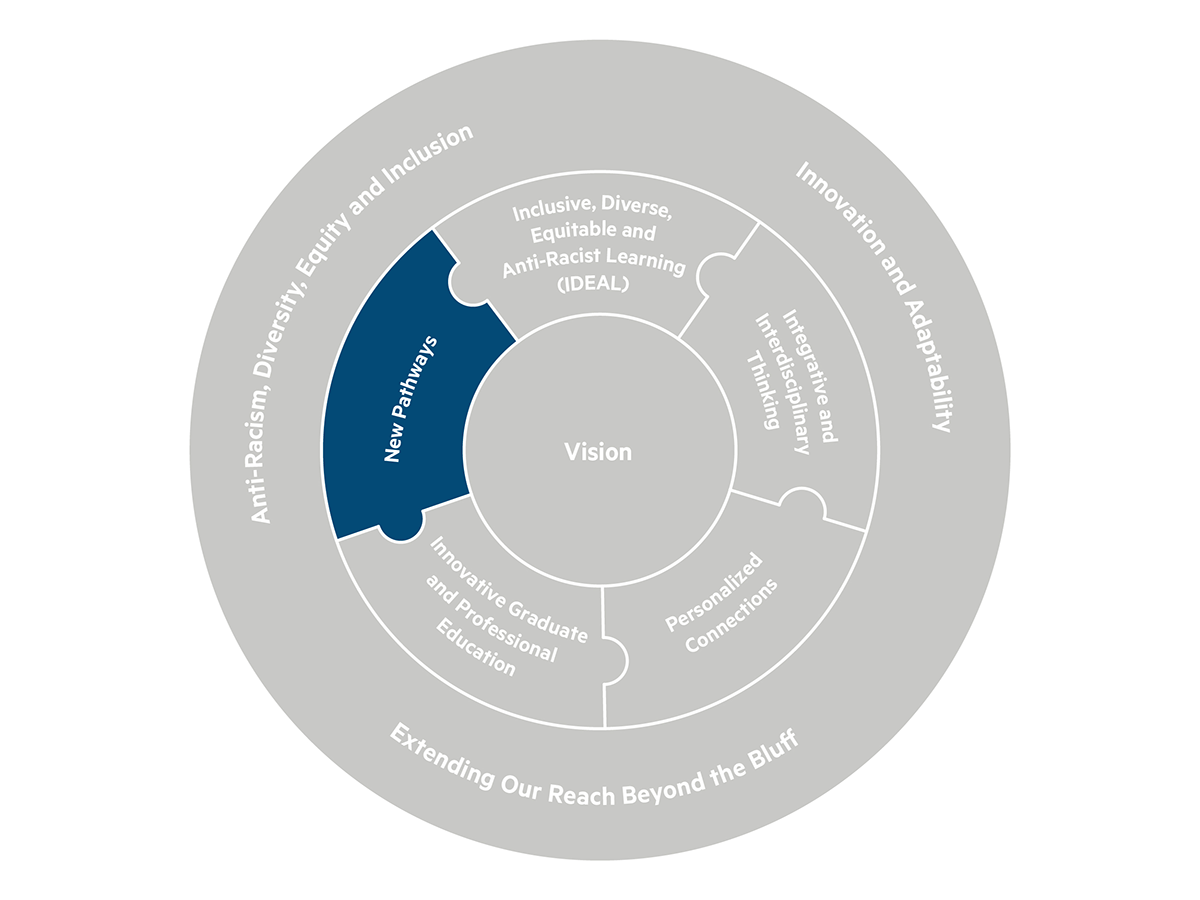
New Pathways Initiative
Increase access and broaden the LMU community by expanding new pathways to an LMU education, especially among community college transfer students, post-traditional students and students in non-degree/continuing education programs.
Rationale and Strategic Approach
A period of disruptive change – including increasing national and global inequality, a U.S. economic downturn, and a looming "demographic cliff" among high school graduates after 2025 – has begun to impede access to an LMU education and has made LMU's recently-strong enrollments appear increasingly vulnerable. In the aftermath of the pandemic, we are more conscious of LMU's dependence on our on-campus and in-person learning modalities, along with the likelihood that higher education's extended experience with pandemic-era online instruction may catalyze an acceleration of online learning trends. To address these issues, LMU should adapt its current modes of serving students to more deliberately embrace the needs of several categories of students, including: (a) community college transfer students; (b) "post-traditional" students, who are characteristically 25 or older, are often transfer students, and typically must balance their studies with full-time employment, dependent care, and other responsibilities; and (c) students seeking non-degree professional and continuing education offerings. Many of these students tend to put a premium on self-paced, accelerated, evening, weekend or other flexible learning options, and may be easier to serve through branch/satellite campuses and/or online/hybrid learning modalities. Learning to adapt to the needs of these new student populations can enable us to fulfill a commitment to improved access while expanding our sources of new enrollments beyond traditional undergraduate populations.
Objectives & Actions
-
Actions:
- Devise an overall enrollment and financial aid strategic plan aimed at balancing stable long-term enrollment patterns with improved access for lower-income students and reduced overall student-loan debt burden for LMU graduates.
- Conduct a market/needs assessment for serving community college and post-traditional students and then devise an appropriate action plan.
- Consolidate and extend where needed our community college pathways programs and partnerships, possibly including developing a "virtual community college" pipeline to LMU.
- Facilitate credit and course transferals from California community colleges and other accredited institutions to solidify transfer student enrollments.
- Explore using prior learning assessments and other mechanisms that recognize educational achievements to facilitate appropriate academic progress for community college and post-traditional students.
- Explore options for expanded online/hybrid learning, flexible learning schedules and self-paced/accelerated degree programs for non-traditional students.
- Expand financial aid, advising, career center and other support services to better accommodate evening, weekend, and after hours learning.
- Support and resource faculty who focus on adapting teaching to serve the adult learner.
-
Actions:
- Establish appropriate academic leadership structures and charge them with re-imagining, re-configuring and re-branding LMU's continuing education offerings.
- Revise offerings of non-degree/certificate programs to ensure expansion in key professional fields, especially leveraging LMU's Playa Vista and Downtown Law School campuses to take advantage of LA's strengths at the nexus of the media-technology sectors.
- Develop outreach approaches that help potential non-degree-seeking learners see themselves as benefiting from an LMU education.
Next Steps
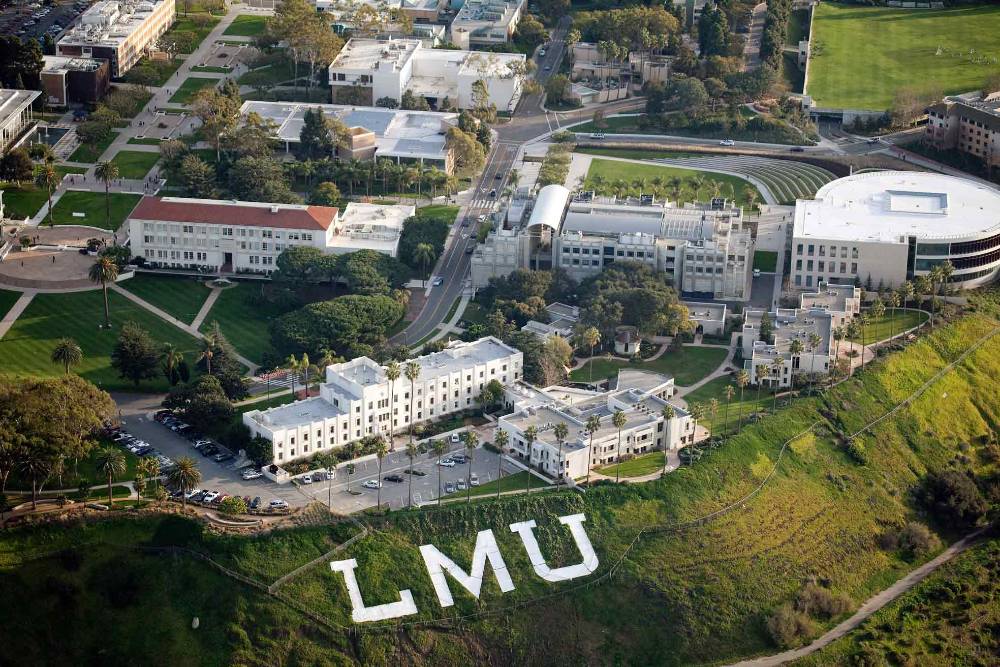
This draft strategic plan has been shared with you for your consideration and insight. In addition to consultation with campus leadership groups, the Steering Committee encourages every member of the LMU community to participate in the discernment process by sharing your feedback with us directly. Based on this feedback, the Steering Committee will revise the draft plan and then present our recommendations to the President and Board of Trustees for review and final approval.
The Steering Committee will also share recommendations with the community later this spring about potential processes, timetables, and metrics for implementing the finalized version of the plan.
.jpg)